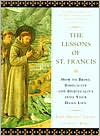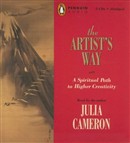
The chapter opened with a quote from St. Bonaventure, who said “Francis sought occasion to love God in everything. In everything beautiful, he saw Him who is beauty itself.” St. Francis composed poems and songs, staged dramas, painted and sculpted. Actually the creativity of the Franciscan movement helped the Renaissance, and various Franciscan groups have attracted many artists, including Dante, Michelangelo and Franz Liszt.
Creativity, of course, actually started with God in Genesis! The term “The Creator” is often used for God. And we are told that “God created man in his own image.” It follows, then, that the more like God we become, the more creative we also become. Julia Cameron wrote The Artist’s Way, a book on human creativity published in 2005. She says that the secret of unleashing human creativity lies in “an experience of the mystical union” with God. She says that “Creativity is God’s gift to us. Using our creativity is our gift back to God.” She goes on to say that “Creativity is a little like opening the gate at the top of a field irrigation system. Once we remove the blocks, the flow moves in.” Again, I thought of my teaching career as I read this. I often told students that the key to removing writer’s block is to “put black on white” or to “move the pencil on the paper.” In other words, just start writing something, and the flow will begin. One must remove distractions (solitude, remember?) and focus on what you want to convey and just BEGIN expressing what you think and feel.
Julia Cameron wrote The Artist’s Way, a book on human creativity published in 2005. She says that the secret of unleashing human creativity lies in “an experience of the mystical union” with God. She says that “Creativity is God’s gift to us. Using our creativity is our gift back to God.” She goes on to say that “Creativity is a little like opening the gate at the top of a field irrigation system. Once we remove the blocks, the flow moves in.” Again, I thought of my teaching career as I read this. I often told students that the key to removing writer’s block is to “put black on white” or to “move the pencil on the paper.” In other words, just start writing something, and the flow will begin. One must remove distractions (solitude, remember?) and focus on what you want to convey and just BEGIN expressing what you think and feel.
Singing in the shower is one example of spontaneous creativity. Your performance may not win a Grammy, but it is an example of creative joy. The need to express your thoughts and feelings in writing is also everyday creativity. Gardening, decorating your home, plating a meal attractively, pairing clothing items in a way that pleases YOUR eye, creating a serene mood by candlelight and soft music, picking up litter or polishing the pews in your place of worship – all of these and many more can be ways of expressing your creativity in appreciation to God. It is easy to be a “consumer creationist” – watching or listening to others perform on TV or the Ipod. One might have to work at being a creator.
Edith Schaffer said, “A Christian, above all people, should live artistically, aesthetically, and creatively. If we have been created in the image of an Artist, then we should look for expressions of artistry, and be sensitive to beauty, responsive to what has been created for our appreciation.”
Henry Ward Beecher said, “Men are like trees; each one must put forth the leaf that is created in him.”
And finally, in the book of Exodus in the Bible, Israel’s crafts people were told, “Make pomegranates of blue, purple and scarlet yarn around the hem of the robe, with gold bells between them.” God gave specific instructions to create beauty in the Tabernacle. Obviously beauty and creativity are important to Him.
Look for ways to bring God’s beauty of color and creativity into your and your family's and friends’ lives.
Wednesday, August 12, 2009
Creativity - The Lessons of St. Francis by John Michael Talbot
Labels: Books, Philosophy
Posted by
Joan
![]() at
11:50 AM
at
11:50 AM
Subscribe to:
Post Comments (Atom)







No comments:
Post a Comment